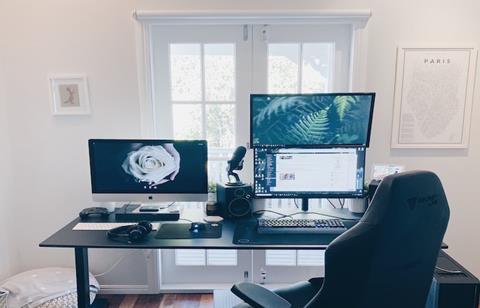
Working from home for some employees is an alien concept which takes some adjustment. When you’re used to a routine that involves travelling to the office, chatting with colleagues, getting into the office ‘buzz’ and collaborating on work projects in the real world of physical meetings, suddenly being plunged into a different reality and turning part of your home into a zoom-focused work den can seem counter-intuitive.
Human beings are generally creatures of habit, and adjusting to the new normal of integrating work and home life can be tricky. But making a positive mental adjustment and embracing this new world will help to make the experience more enjoyable, rather than something to dread.
A work day, whether it’s in an office, at home or elsewhere should encompass elements of self-care within a pleasant working environment that enables us to maintain maximum health and wellbeing on all levels - physical, mental and financial.
The fact that home working is now becoming much more usual has shone a brighter light on the need for wellbeing in all its forms, which is a good thing. Everyone should be able to cultivate and practise healthy habits so as to maintain a healthy lifestyle which also enables maximum productivity and contentedness.
How employers can help
Employers are recognising this syndrome in ever greater numbers and are starting to provide advice, guidance and tools to their employees as they see all of the benefits - both from the employer’s and employee’s perspective.
In order for an employee to plan their working life from home, they will need to consciously put in place some rules and facilitate access to external resources - some employers may help in this respect and even provide these.
Setting up a home working desk environment properly is essential, with enough room to move around regularly and ideally with natural light. The chair should be comfortable and at the correct height; some employers have experts in ergonomics to offer guidance on this, some will provide the equipment as well.
Encouraging employees to adopt healthy habits
Moving around frequently is key, and consciously breaking up sedentary time is vital for employee health, so doing regular exercise is vital - some of this can be done around the desk area, and it is also very important to build some cardio exercise like walking, running or cycling into the working day. It’s all to easy to get carried away with work assignments and not move from the desk for hours at at time - this is not a good prescription for long-term health and can become a dangerous habit for those of us who work at computers.
One of the great advantages of working at home is flexibility. And when it comes to getting adequate nutrition, cooking using fresh ingredients will pay dividends for maximising productivity and general wellbeing. So instead of going to the nearest takeaway or sandwich shop as most people do in an office (or even skip lunch altogether), encourage your employees to make the effort to prepare something fresh and nutritious - they will be all the better for it, and reap the benefits both physically and mentally. Water intake is also vital - at least 3 litres per day is ideal and fizzy drinks should be avoided at all costs as these are loaded with sugar and additives.
Mental health is one of the big challenges of lockdown, and whether it’s isolation and lack of communication with colleagues or change of routine, there are many reasons why people are suffering with this. Encourage your employees to build some meditation or mindfulness into your day, to maintain a sense of perspective, and maximise communication with work colleagues - whether it’s via zoom calls, emails or the mobile. Making a phone call can be hugely helpful as it is something we are all getting out of the habit of doing, and that little piece of interaction can be really uplifting as well as helpful for a work project, where previously taking part in a physical meeting would have been more usual.
Getting the proper amount of quality sleep is also vitally important and is one of the areas many people have had problems with during lockdown.
Wellbeing is interconnected through physical, mental and financial elements - so if there is one or more of these aspects that is out of sync, many employees may end up experiencing sleep problems. Also, caffeine intake is something that affects sleep, so exceeding the recommended daily amounts is not recommended, in particular later in the afternoon and into the evening.
Meditation, mindfulness, exercise and good nutrition will help with sleep - as well as the discipline of going to bed at a time that allows for at least 7 - 8 hours of quality sleep and waking up refreshed and ready to tackle the activities of a new day.
Helping employees to manage their finances effectively is another vital part of wellbeing, and one which is becoming more of a discussion point than ever. If employees have money worries they will be distracted at work and be more likely to suffer from stress and maybe even become ill. Providing help to employees to be able to manage this is an important tool in the wellbeing armoury, and another way of helping to form positive habits that will last a lifetime.
Adopting these healthy practices across all areas will allow the body and mind to function properly, and gives a focus for planning out each day with a structured approach. It is more important now than ever before to equip employees with the right information and help, and if deployment by the employer is accompanied by employee participation it will pay dividends during lockdown and beyond.











